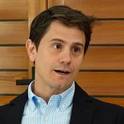
Popular Press
Innovation Fund enables students to tackle tough issues
WSB Dean’s Report to Investors
(2017)
Abstract
As the architect of a small village of tiny houses designed to help the homeless, Ed Kuharski of Green Design Studio in Madison, Wisconsin, is accustomed to getting phone calls from people wanting to talk to him about his work with affordable housing. One phone call last year, however, caught him by surprise.
“To have a call come from the Wisconsin School of Business was pretty intriguing to me,” says Kuharski, whose development is in a neighborhood near the Wisconsin State Capitol. “It was very welcome to hear.”
The call came because of a unique collaboration between a real estate professor and the WSB’s educational innovation team that was made possible by the WSB’s Innovation Fund. Undergraduate students in an Urban and Regional Economics class didn’t just learn from a textbook or the professor’s lectures, they learned from the community about the problems of homelessness and affordable housing as well as formulating ways to offer solutions.
“We wanted to make sure students understood that this affordable housing project was very important,” says Jaime Luque, assistant professor of real estate and urban land economics at the Wisconsin School of Business. “It’s an important issue for urban economics because people don’t have homes and if we are able to persuade some of the students to become developers we’ll be able to have an impact in society.”
Innovation Fund resources helped create a team approach to teaching about affordable housing. Luque was joined by Suzanne Dove, assistant dean for academic innovations at WSB, Ron Cramer (B.A. ’91, M.S. ’96), learning designer at the WSB, and WSB staff member Angela Richardson (B.A. ’93, M.A. ’14, MFA ’15), who coordinates arts-based learning activities for students, faculty, and staff as part of WSB’s emphasis on integrating the liberal arts with business education. An original plan that included some hands-on work and guest speakers became an opportunity for students to get out into the community and learn firsthand about the issues surrounding affordable housing. That expansion put into action the Innovation Fund mission of creating opportunities to employ new teaching approaches and inspiring learning experiences.
Teams of students were tasked with creating a hypothetical affordable housing development. Insights offered by guest speakers and community members who spoke to students individually enhanced classroom work. The project didn’t differ greatly from what students would do as real-world developers—conduct interviews, write reports, and make presentations, Luque says.
"Our students gained empathy and an understanding of the humanity of the situation"
—Angela Richardson, WSB Project Designer
Guest speakers ranged from Madison Mayor Paul Soglin (B.A. ’66, JD ’72), to directors of homeless shelters as well as developers and lenders. Richardson made connections that allowed students to interview members of the Madison community who work with issues of homelessness and affordable housing. Leah Pope (M.A. ’14, Ph.D. ’18), a graduate student in English, joined the project to coach students on the written portion of their proposals that were presented in class.
The project took its inspiration from the book Evicted: Poverty and Profit in the American City, which was the selected work for the campus Go Big Read initiative. In summer 2016, Dove approached Luque to see if he would be interested in incorporating the book into his class in the Department of Real Estate and Urban Land Economics. He already planned a module about affordable housing, and thought with extra support he and the team could create a project in which the students could play the same role the book’s author, Matthew Desmond (M.S. ’04, Ph.D. ’10) played—talk to the people whose lives and work are impacted by issues of homelessness and affordable housing.
It turned out to be an eye-opening experience for students, who were joined by faculty and staff as well as community members at a semester-ending event that recapped the project.
“Living in the dorms or going to class, you kind of have tunnel vision, you don’t really focus on the problems people in the rest of the city are facing,” says Joe Curtin (BBA ’18), who was part of a team that interviewed two United Way staff members who work in housing. “I wasn’t aware of the extent of the homelessness problem in Madison and it’s really given me an understanding of it."
Pope says she was moved by the empathy and compassion the proposals demonstrated. Students shared that the homeless included women, children, veterans—a range many students hadn’t considered.
“Whoever students talked to, they ended up with a profound attachment to serving that population,” Pope says.
Students learned skills they’ll need in any professional environment—communication, teamwork, listening, presenting—and something more, too.
“Our students gained empathy and an understanding of the humanity of the situation,” Richardson says. “Going to a women’s shelter to conduct an interview and perhaps getting a tour while there, it makes the issue so much more real. It’s no longer ‘the homeless’ as an abstract category, it’s now an actual person that the student has just met face-to-face.”
The project also opened students’ eyes to another potential career track in real estate. “You truly could have an entire career developing affordable housing, helping people and making a living,” says Rollie Johnson-Schunk (BBA ’17). “I never even considered the option before.”
Keywords
- affordable housing,
- homelessness
Disciplines
Publication Date
Spring 2017
Citation Information
Jane Burns. "Innovation Fund enables students to tackle tough issues" WSB Dean’s Report to Investors (2017) Available at: http://works.bepress.com/luque/32/
Creative Commons License

This work is licensed under a Creative Commons CC_BY-NC-ND International License.
